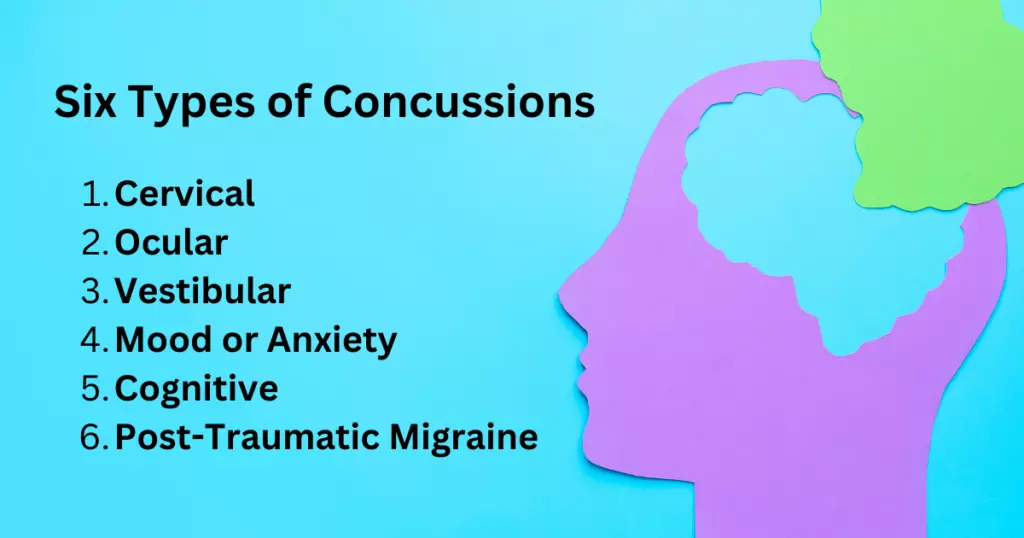Concussion causes are nearly too numerous to list. They include everything from the rapid acceleration and deceleration in car collisions to the impacts sustained in slip-and-fall accidents. One thing concussions have in common is that they can be catastrophic for the injury victim and their family. We know how overwhelming it can be to get back on your feet after a significant accident. That is why our attorneys are here to guide you and help you to receive the compensation you need. Below are the six main types of concussions to be aware of when filing your claim.

The Six Types of Concussion
There are six general types of concussions. Understanding the differences will help you recognize the contours at play in your claim for your injuries. If you have any questions, reach out to our accomplished lawyers at GJEL Accident Attorneys.
Cervical
A cervical concussion occurs due to a sprain in the cervical spine. Carrying a large backpack or having improper posture can worsen symptoms of this kind of concussion. There are several symptoms of a cervical concussion, including the following:
- Headaches,
- Neck stiffness, and
- Dizziness.
If you have suffered from a concussion, contact our compassionate attorneys today. We can advocate for you and help you to recover the compensation you deserve.
Ocular
An ocular concussion can make it challenging to perform visual tasks. Multiple symptoms may point to an ocular concussion. A few of those potential signs consist of the following:
- Eye pain,
- Eye strain, and
- Difficulty reading.
Seeking medical care as soon as possible is vital if you believe you have suffered a concussion. A qualified medical professional can help you determine the appropriate course of treatment.
Vestibular
You may feel like the room is spinning when you have a vestibular concussion. You may also have trouble balancing or difficulties with your vision. Besides these symptoms, other signs of a vestibular concussion involve:
- Nausea,
- Eye strain, and
- Spatial impairment.
You may need numerous kinds of medical care after this type of concussion, including vestibular therapy. Vestibular therapy can help you increase your coordination and balance.
Mood or Anxiety
Another type of concussion is a mood or anxiety concussion. This can often be exacerbated by a family history of anxiety or ongoing worry. Signs of a mood or anxiety concussion may consist of the following:
- Excessive worrying,
- Extreme rumination, and
- Abnormal sleeping patterns.
Stressful events or a history of migraines can also cause anxiety or mood concussions. Treatments that can help you include counseling or a prescribed exercise plan.
Cognitive
A cognitive concussion can create difficulties with mental tasks and trouble with attention levels. It can also cause a person to have memory problems. Other effects of a cognitive concussion include:
- Slurred speech,
- Irritability, and
- Convulsions.
Contact your healthcare provider to analyze your symptoms further. You may need a magnetic resonance imaging (MRI) scan or other tests to determine the extent and nature of your concussion.
Post-Traumatic Migraine
A post-traumatic migraine is a type of concussion that can appear up to seven days after sustaining an injury. Individuals typically heal from this kind of concussion in three months, but the healing process can be much longer for some people. Symptoms of a post-traumatic migraine include:
- Memory issues,
- Poor concentration, and
- Personality changes.
Depending on the severity of your concussion, the medical treatment necessary may vary. If your concussion is mild, you might recover in a matter of days. If it is more severe, healing may take weeks or months. Untreated concussions can have significant consequences, so it is essential to see a doctor right away.
What Are the Various Levels of Concussions?
In an accident, there are numerous grades of concussions that a person may experience. You should seek medical care right after an accident to ensure that you do not have any hidden injuries. Individuals can typically heal over time from a concussion with appropriate medical treatment.
Grade One
A grade one concussion is the mildest level of concussion. Mild concussion symptoms might include memory loss, nausea, and headaches. You may also experience difficulty concentrating. Typically, after a grade one concussion, you can get back to everyday activities after several days.
Grade Two
A grade two concussion is equivalent to a moderate concussion. Moderate concussion symptoms may involve a temporary loss of consciousness in addition to the symptoms mentioned above. You might not be able to return to everyday activities for several days after experiencing a grade two concussion.
Grade Three
A severe concussion involves a loss of consciousness for over five minutes. Severe concussion symptoms might consist of amnesia, seeing stars, and speech difficulty. There may also be behavioral or cognitive difficulties as a result of a grade three concussion.
How Our Lawyers Can Help
At GJEL Accident Attorneys, we are here to assist you if you have suffered from a concussion. Our lawyers can help you to file your claim and receive the compensation you need for your injuries. Furthermore, we can aid you with every aspect of your claim. This includes communicating with your health insurance company, gathering medical records, negotiating settlements, and pursuing a remedy through litigation.
We have fought for our clients in California for more than 40 years. With a 99% success rate, we are prepared to advocate for you. Do not hesitate to reach out to our friendly team if you have any questions. Give our experienced attorneys a call today for a free consultation at 1-866-292-9907.
Visit our office nearest to you.
